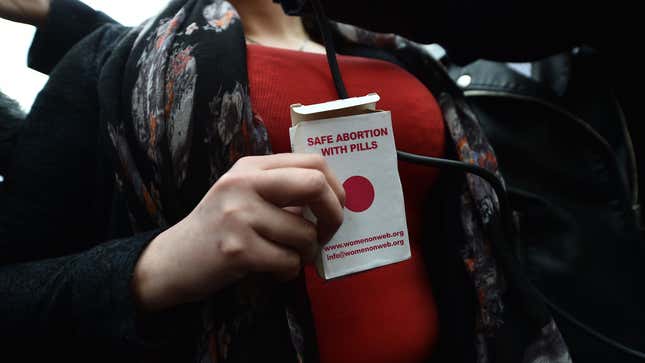Doctors and Major Reproductive Health Organizations Just Took a Decisive Stand in Support of Self-Managed Abortion
JusticePolitics

In the spring of 2018, the Austria-based organization Aid Access started providing the two drugs needed for a medication-induced abortion, mifepristone and misoprostol, by mail to people in the United States. Its founder, a Dutch physician named Rebecca Gomperts—whose other organizations Women on Web and Women on Waves have worked to make abortion pills available online and by sea for years—estimates that Aid Access has fulfilled requests from 600 U.S.-based women in the span of six months, despite having virtually no public rollout. But in March of this year, the Food and Drug Administration sent a letter to Aid Access, along with an online pharmacy named Rablon, ordering both services to stop the sale of mifepristone and misoprostol—despite the fact that, when used as directed, the drugs are proven to be safe and effective. That hasn’t stopped Gomperts.
“I will not be deterred,” Gomperts wrote on the Aid Access website that same month, adding that: “When U.S. women seeking to terminate their pregnancies prior to 9 weeks consult me, I will not turn them away.” While Aid Access gives people the option to self-manage their abortions in the privacy of their own home, the fight to keep the online provider open has turned public. This is just one example of how abortion providers are holding their ground against federal and state lawmakers who wish to roll back access.
On Monday, 75 organizations, doctors, and researchers joined that public fight, signing an open letter that stands behind the work of Aid Access and articulates something healthcare providers have known for a while: that right now in the United States, the risk involved with seeking a self-managed abortion is legal— not medical.
“[D]ue to the politics of abortion, medication abortion has been over-regulated by the FDA, and pushed further out of reach for many by state restrictions,” the letter reads. The signees—which include Women on Web and the National Abortion Federal—also point out that Aid Access’s fight against the FDA must be viewed in the context of the current political climate. Attacking telemedicine providers like Aid Access is just one tool in abortion opponents’s toolbox to roll back access to abortion, wherever it exists.
But that doesn’t mean, necessarily, that self-managed abortion—or abortion by mail—are going away anytime soon, or that providers like Gomperts don’t stand to make some gains now in the fight to increase access. Jezebel spoke to Farah Diaz-Tello, senior counsel at the reproductive justice organization If/When/How, about the battle to protect access to self-managed abortions. Our conversation has been edited and condensed for clarity.
JEZEBEL: What is the biggest misconception around self-managed abortions?
FARAH DIAZ-TELLO: I think the biggest misconception that people have is the overall sense of what it looks like. People have a lot of ideas from prior to Roe v. Wade, the image of the coat hanger and all that, and they might think that self-managed abortion doesn’t exist anymore. Or that it’s extremely unsafe and it’s people acting out of desperation. The reality is that—thanks to reproductive health technologies and people having more access to information than they did in the ‘60s and before—self-managed abortion can be a safer and satisfying experience. It’s not necessarily an act of desperation for everyone. Maybe there’s no provider in their area, or abortion has been made inaccessible by lawmakers, or it’s too expensive. But maybe some people also prefer a more self-directed option. And so the ability to, in this instance, get pills sent to them to their home and consult with somebody over the internet would be a really appealing thing.
“Whatever the law on abortion has been, people have always found ways to end pregnancies.”
The other thing is about medication abortion, specifically. People may have absorbed the misinformation abortion opponents are putting out, and believe that abortion with pills something that is uniquely dangerous or particularly harmful. A lot of people might not know that abortion with pills has been around for about two decades and has proven to be extremely safe. So the excessive, onerous barriers that are placed on accessing it are actually just serving to cut people off from the really important medication that can be life saving.
Do you think that anti-abortion lawmakers take advantage of the lack of knowledge around medication abortion and seize that as an opportunity to play up what they see as medical risks involved?
-

-

-

-

-

-

-

-

-

-

-

-

-

-

-

-

-

-

-

-

-

-

-

-

-

-

-

-

-

-

-

-

-

-

-

-

-

-

-

-








































